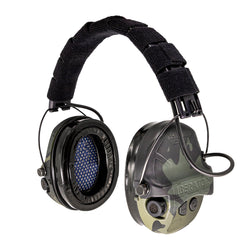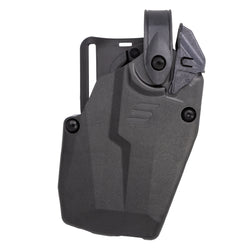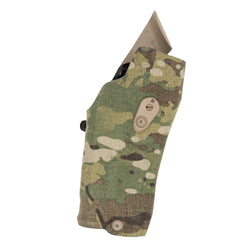There is a common misconception that an airline traveler cannot pack their firearms with them. Security measures exist for passengers, and separate screening measures are in place for checked baggage. While the average citizen can’t carry a gun on their person on the plane, their baggage with unloaded and locked firearm(s) can be screened and loaded (not that type of loaded) onto the plane.
For close to two decades, I’ve traveled with firearms for work and pleasure. There are generally accepted guidelines to follow and plenty of resources online to cover 99% of the situations you’ll encounter. This article addresses some of the lower probability occurrences and how to handle them should they arise.
Disclaimer: This article is for informational purposes only and is not a substitute for legal advice. Always consult the specific laws and regulations of your airline and destination jurisdiction before traveling with a firearm.

The Airport Check-In Process
Knowing the rules and practicing respectful communication can make the process easier.
Declaring Your Firearm—Choose Your Words Carefully
Sounds simple, yet simple scrutiny will cause some to stammer, misspeak, or freeze at the check-in counter. Remember to say you are “checking an unloaded firearm” instead of saying, “I have a gun in my bag I need to declare.” One of those statements sounds professional, while the other may not register well.
Some airline representatives will ask you to open the case or luggage. There is no need to fight this request. Remain calm and make sure to block the view of others in the check-in line from seeing the contents of your bag.
It also helps to have the specific airline regulations printed out to avoid additional confrontation. Even with printed proof of the contrary, don’t argue with airline representatives.
Firearm Cases—One Lock Per Latch
Smaller lockable cases typically have two security latches, while longer cases have four. Though two locks are all that is necessary to secure a case, it isn’t uncommon for an air carrier to require additional locks for the remaining two.
Additional locks can be added to your rifle case or tucked in your carry-on bag. Should security screeners request locks on every latch, smaller TSA locks can be added to the case, with two heavier-duty locks on it already.
For greater security, common advice is to use heavy-duty, non-TSA locks for your firearm cases. By the way, don’t accidentally pack the key in other bags you check. Always carry a spare key looped around your belt and in your pocket.

Packing Your Gear
Proper packing and knowing the limits for ammunition are critical to avoiding delays and confiscation.

Traveling With Ammunition
Most airlines will require ammunition to be carried in its original container or in an aftermarket container where all rounds are separate. Some airlines allow up to 11 pounds of ammunition per traveler.
I prefer carrying my ammunition in semi-opaque containers where I can visually confirm each round has its place. On that note, make sure to check every pocket of clothing and pouch for loose rounds.
If you are traveling with a hunting rifle and have a successful hunt, fill the empty space in the ammo container with your spent round. This will help maintain your sanity.

When to Pack Two Handguns
Some firearms are better equipped for four-legged threats than two. Most dedicated concealed carry pistols are not ideal for dangerous game protection. For this reason, you may want to pack two handguns, and if your case is large enough to accommodate one, it can probably fit two.
Depending on the schedule of your trip, you may split your time between the woods and around town. With two firearms, one can be carried more appropriately than the other, with different levels of concealment. Of course, no pistol can compete with a proper rifle or shotgun for dangerous game. Remember that.

Federal and State Firearm Travel Laws
Your greatest responsibility as a traveler is knowing the laws that govern possession, which shift drastically from state to state.
How FOPA Protects Interstate Gun Travel
The Firearms Owners Protection Act (FOPA) is the overriding federal law protecting you as a traveler. As long as you can legally carry in the states you travel to and from, peaceable journey is permitted. This law is designed to cover your transit through non-permissive jurisdictions.
That said, what you carry may not be legal where you are headed.
Navigating Local Laws
Prior to your trip, look up the local laws where you are headed. Magazine capacity, threaded barrels, and other “evil features,” as politicians refer to them, could make you break a law when you take possession of your bags.
Additionally, not all ammo is created the same or legal in all places. Some hunting regulations may require you to use solid monolithic and non-lead ammo. The same is true of hollow-point ammunition (thank you, New Jersey).
Should you encounter a police officer, do you know if you must inform them that you are carrying a firearm? Do you know if you are allowed to carry in an establishment that serves alcohol?
From state to state, the laws are going to vary, and you have the responsibility of knowing them.

Cancelled Flights and Overnight Stays
Airline travel is incredibly safe and, for the most part, reliable. However, there are mechanical reasons and some weather conditions that will ground a plane. One of the greatest legal risks occurs when an airline disruption forces you to temporarily leave the airport.
Should you have a flight cancelled and be given the option to find accommodations in a connecting city, don’t volunteer yourself for law enforcement scrutiny when you check back in the following day.
Rather than collecting your bags, insist the airline hold onto them. They can legally possess your bag overnight, but you cannot if the contents are outlawed. Build a habit of carrying overnight supplies in your carry-on bag. Not all connecting cities are firearm-friendly. Should you collect your bag and travel to a local hotel, you could technically possess a firearm where it isn’t legal.
Security at Your Destination
Once you have safely retrieved your checked baggage, you must consider security outside of the airport.

Securing Firearms in a Rental Car
If your travel requires a rental car, the contents of that vehicle will only be protected by glass that only keeps good people out. Your daily driver may have lockable hard cases, but your rental car is likely bare bones with no apparent accommodations to secure your kit.
Should the need arise to stow a firearm in your rental car, cable locks work great to slow down theft. No security measure will last forever, but a couple of cable locks around the locks in the case and holes or bars underneath the seats will make running off with your kit much harder.

Larger cases can be covered with a simple, cheap bed sheet and secured with cable locks to the child seat attachment points or those where the folding seats latch onto. Where you park your car can be a deterrent.
Remember: it is never advisable to leave firearms overnight in vehicles if you can take them in.
Conclusion
When you are on vacation, it’s easy to let your mind take a break. Some would rather leave their firearm at home than go through the “trouble” of packing it, but trouble is a relative word.
With the right understanding, traveling with a firearm isn’t trouble at all. If you can legally carry, you should.
Trouble shows up when it wants to and not when you need it or want it. You have a say in how you address trouble, but only if you pack those options when you travel.









